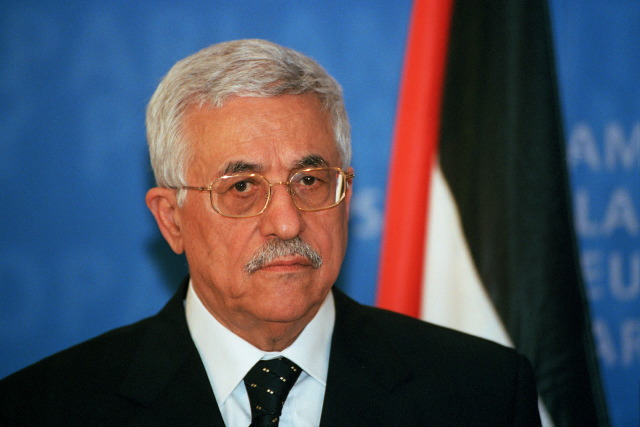UPDATES
Abbas’ new “peace plan”
September 12, 2014

Update from AIJAC
Sept. 12, 2014
Number 09/14 #03
Last weekend, at a closed session of the Arab League Summit in Turkey, Palestinian Authority (PA) President Mahmoud Abbas reportedly announced his plan to move ahead with peace process with Israel, and had it endorsed by the Arab League. While the details have not been publicly announced, they have been leaked in various news reports and reportedly entail a plan that the UN Security Council would make Israel withdraw to the pre-1967 boundaries within three years – or else Israel would be brought before the International Criminal Court and security cooperation with the Palestinians ended – if agreement on a final peace is not reached between the parties during a nine-month negotiating process. The plan has reportedly been rejected by the US Administration. This Update deals with the difficulties of this plan, and the wider problem of Israeli-Palestinian peace making after the Gaza conflict.
First up is an analysis of the Abbas “plan” from American commentator Tom Wilson. He notes that the plan seems to be booby-trapped against Israel at every turn, requiring a guarantee Abbas will get everything he wants even without any agreement before negotiations even start, and it was therefore unsurprising that it was rejected by the Americans. He then explores the motivation for the proposal, and argues that it is about Abbas attempting to seize back some initiative at a time when polls show Hamas has benefited enormously in Palestinian opinion from the Gaza war. For the rest of his analysis, CLICK HERE. Israeli academics Gilead Sher and Liran Ofek explore further the political pressures that Abbas is trying to manoeuvre around with his proposal – including especially a lack of domestic legitimacy for serious negotiations with Israel – here.
Next up, Israeli blogger and New York Times contributor Shmuel Rosner, who argues the demand for Israel to withdraw to the 1967 lines within three year regardless of whether or not an agreement with the Palestinians is reached is not only unwise but immoral. He makes the case in terms of the old argument about linkage – the disagreement over whether solving the Israel-Palestinian conflict is the key to solving other major Middle East problems. He notes that no one can seriously make this argument anymore, given what is happening in Syria, Iraq, Egypt, Iran and elsewhere . Moreover, given the dangers regional chaos poses to Israel, and the experience following the unilateral withdrawal from Gaza, he argues that demanding such withdrawal is thus making “bloodshed more likely” and also risking “the lives of many – Israelis, and also Palestinians”. For his important argument in full, CLICK HERE. Rosner also had an interesting piece on the New York Times website recently about how its alliance with international elements seeking to pressure Israel has damaged the Israeli Left – and he responded to critics of his piece here.
Finally, veteran Australian leader Isi Leibler, writing in the New York Times, surveys Israel’s situation vis-a-vis the Palestinians in the wake of the Gaza conflict. He argues that while the two-state solution remains essential as Israel’s long-term goal, the realities of Hamas control of Gaza and the wider regional dangers, especially in the form of ISIS, mean that major moves toward this end are untenable in the immediate future. He also has some important insights into Israeli relations with Washington, Israeli policy toward building in the settlements and the importance of Israel’s growing confluence of interest with Arab states like Egypt and Saudi Arabia. To read all that he has to say, CLICK HERE.
Readers may also be interested in:
- A good summary from BICOM of where things stand on various Israeli-Palestinian negotiations after the Gaza conflict.
- Popular Israeli columnist Nahum Barnea has more on Abbas’ current calculations. Plus, a strong reaction from Israeli Strategic Affairs Minister Yuval Steinitz to Abbas’ proposal.
- Reports (here and here) that Egypt offered Abbas a large area of northern Sinai to be part of a Palestinian state and allow re-settlement of Palestinian refugees, but Abbas refused. Commentary on the significance of this from Jonathan Tobin and Israeli pundit Yoaz Hendel.
- More on some of the recent ructions between Abbas and Hamas, with Abbas blaming Hamas for killing 120 Palestinians for breaking curfew, and with Fatah officials promising Gaza will “not get a penny” unless Hamas agrees to put the strip under “legitimate authority.”
- Palestinian elections have been postponed again – plus some comment from Tom Wilson.
- Officials from Abbas’ Fatah party say a soccer game between Israeli and Palestinian kids amounts to a “crime against humanity.” Meanwhile, an official PA daily accuses US President Obama of being a “sadist” driven by black suffering to enjoy seeing Gazans killed as “compensation for what happened to the blacks.”
- Top Israeli security analyst Amos Yadlin explores how to stop Hamas rebuilding its military capabilities. Meanwhile, American columnist Mortimer Zuckerman sees glimmers of hope that it might now be possible to end the repeated rounds of conflict over Gaza.
- More on the roots of the Gaza war from American academic Robert Lieber.
- Two writers in the important Arab newspaper Asharq Al-Awsat take on the myth that Hamas won the Gaza war – here and here
- In a video, Hilik Bar MK, a senior figure in Israel’s opposition Labor party, explained to an AIJAC audience last week why the settlements are not the major obstacle to peace they are often presented as.
Abbas’s Rigged Peace Plan
Over the weekend Palestinian Authority President Mahmoud Abbas was in Cairo at the Arab League conference. Precisely what Abbas said to the foreign ministers of the other Arab countries remains unclear, as his keynote address was declared a closed session at the last minute. However, during his stay in Cairo Abbas was meeting with Egyptian President Sisi and others in an effort to drum up regional support for his new peace initiative. Indeed, the head of the Arab League, Nabil el-Araby, has hailed Abbas as being ready to negotiate a final settlement.
Washington is noticeably less confident. After Abbas dispatched his chief negotiators to meet with Secretary Kerry, U.S. officials have criticized the plan as “unilateral” and even hinted that there would be an American veto should Abbas seek to pursue his plan at the United Nations and in the Security Council.
This chilly response from the administration, usually so impetuous about racing ahead with the peace process, should certainly send some alarm bells ringing. After all, given that Abbas all but shut down the last round of peace negotiations, finally fleeing them just at the moment at which a decision had to be made about their extension, one has to wonder why he is suddenly so eager to resume the talks. And why now exactly? Having apparently been only too pleased to escape the negotiation table, why is Abbas suddenly so determined to be seen as reengaging?
After all, Abbas had every opportunity to continue with the U.S. sponsored negotiations that the Palestinian Authority had been participating in until May of this year. Yet Abbas had refused to extend the talks unless his extensive list of demands were met in advance, insisting that the Palestinians would instead pursue membership of several key international bodies. The Israelis had agreed to a dramatic increase in the number of Palestinian terror prisoners that they would release provided that Abbas agreed to press on with negotiations and stay away from the international bodies. Abbas chose to forgo both the additional prisoner releases and an extension of the talks. Now he insists he is ready to get back to talking peace with Israel.
One reason for Abbas’s sudden turnaround stems from his own Fatah faction’s standing in the wake of the recent war in Gaza. It might be assumed that after the death and destruction that Hamas’s war wrought on the people of Gaza, that terror group would have fallen permanently out of favor. Yet perversely the bloodletting has apparently only endeared Hamas to the Palestinian public. Recent polling shows that in both Gaza and the West Bank Hamas enjoys unprecedented levels of approval, with 74 percent expressing a desire to see Hamas’s terror tactics extended to the West Bank. Unlike Fatah, Hamas is seen as engaging in real “resistance.” And because both the Obama administration and the Europeans put such considerable pressure on Israel to reward Hamas’s terror war by granting far-reaching concessions, the message was received loud and clear on the Palestinian street: terrorism gets things done.
Abbas is desperate to be seen to be regaining the initiative. Yet given his past record, it would be mistaken to imagine that he has suddenly become serious about ending the conflict with Israel. Abbas has had multiple opportunities to achieve Palestinian statehood but has shirked the responsibility every time, knowing full well that an Israeli withdrawal would mean his inevitable overthrow by Hamas. Rather, as becomes apparent when one looks more closely at what is being put forward by Abbas, the focus is less on achieving peace and more on establishing a series of penalties against Israel for when the talks fail to bear fruit, as Abbas knows will be the case. This isn’t about reconciliation, this is about demonstrating to the Palestinian public that diplomacy is still an effective way of waging warfare by other means.
From what we know about the plan–from Abbas’s own words to Israel’s opposition leader Isaac Herzog and from what has been leaked by former PA minister Mahmoud al-Habash–the plan is booby-trapped against Israel at every turn. The plan allows for negotiations to take place for a maximum of nine months, with that period being broken down into a timetable for reaching agreement on the key issues of Abbas’s choosing, with borders clearly featuring as his highest priority. If at any point this process doesn’t go according to plan and Abbas’s timetable isn’t kept to then Abbas is threatening to drag Israel before the International Criminal Court, to end cooperation on security in the West Bank and to resume efforts to achieve statehood via the UN.
There were many reasons to suspect that the last round of U.S. sponsored negotiations were unfavorable to the Israeli position, but even that playing field wasn’t uneven enough for Abbas. The only negotiations Abbas is interested in are ones that are fixed in his favor–fixed to ensure he gets what he wants, and more importantly, fixed to punish Israel if he doesn’t. For the moment even John Kerry appears nervous about backing so outrageous a proposal as this one. But with Abbas expected to announce his initiative later this month at the UN General Assembly meeting, we’ll see if the administration’s opposition holds out.
Back to Top
————————————————————————
A West Bank evacuation “in three years” is unwise and immoral
Jewish Journal, Sept. 9, 2014
In the old days – that is, a decade ago or so – the debate about the Israeli-Palestinian conflict was often described as one between those who think that “the road to Baghdad runs through Jerusalem” and those who think that “the road to Jerusalem runs through Baghdad”. That is, between those who believe that solving the Israeli-Palestinian conflict is key to quieting a stormy Middle East and those who believe that the Israeli-Palestinian conflict will become easier to solve only when the Middle East becomes quieter.
This debate has been referred to as the “linkage” debate. In 2007, the so-called Baker-Hamilton report about the war in Iraq stated that “the United States will not be able to achieve its goals in the Middle East unless the United States deals directly with the Arab-Israeli conflict”. That’s linkage. If one believes in linkage, one can rationalize the great emphasis put by international players on the relatively minor issue that is the Israeli-Palestinian conflict.
Israel is small, the occupied territories are small, the two peoples at issue are both small, and the level of bloodshed is, well, comparatively low. Of course, the recent Gaza war was violent and the number of Palestinians killed, many of them civilians, was devastatingly high. Yet there are other conflicts in the region and the world in which the number of casualties is much higher. And these conflicts often get a level of attention that is proportionally low compared to the attention given to Israel-Palestine. Linkage – that is, the dangerous impact of the Israeli-Palestinian conflict on regional trends – makes the focus on the “conflict” logical. If Israeli concessions and evacuations would result in a peaceful Middle East, a push for quick resolution could be logical, even amid Israeli resistance.
But recent events in the region demonstrate why serious people should no longer make “linkage” arguments. Not even the most avid believer in the prospect of a successful Israeli-Palestinian peace process could argue with a straight face that the resolution of the Israel-Palestine problem would make ISIS, Iran’s nuclear program, Syria’s bloody war, or any of the region’s other problems, go away – the Arabs themselves have realized long ago that the real threat for them is not Israel. Those who still insist on linkage are either obsessed with Israel (for reasons that suggest they have a deeply-ingrained bias against it) or as comical as former President Jimmy Carter was when proposing in the early Nineties that the solution to Iraq’s invasion of Kuwait, before the first Gulf War, is for Israel to withdraw from the West Bank.
If there is no linkage, though – if there is no way that Israel’s ending the occupation is a key to solving urgent problems – why the insistence on going in that direction? Why is this conflict treated with so much urgency*? One reason, surely, is the immoral circumstances in which Palestinian residents of the West Bank find themselves, devoid of political rights and living under Israeli occupation. Fighting for morality is no doubt a noble cause. A second reason would be based on cold calculation – namely, on the presumption that if Israel would like to remain a “Jewish and democratic” state it has to stick with a two state solution, as imperfect as it might be.
But is it moral and wise to currently demand or strive for an Israeli withdrawal from territory? Just last week, radical forces defeated the forces of the Syrian army, chased UN forces away, and took control of the Israel-Syria border area. Looking at the photos of al-Qaeda affiliated fighters waving their flags just across the border from Israel, it is only natural for an Israeli to remember that not very long ago good people attempted to pressure Israel to withdraw from the Golan Heights (of course, that was also for the moral and wise cause of peace with Syria). A few weeks ago Israel ended a two-month campaign against the radical Hamas in Gaza. Israel, almost ten years ago, left Gaza and watched it fall into the hands of Hamas. The result is a perpetuation and intensification of a violent conflict and more bloodshed than before. Israelis suffer from rocket attacks, but it is the number of Palestinians killed in Gaza following Israel’s withdrawal that went up.
Thus, it is also natural for an Israeli to wonder if now – when radical groups seem to be gaining ground all around the region – is really the best time to ponder a possible evacuation of territory. Even under the assumption that the Palestinian Authority means well, and that its leaders truly want peace, is now the right time to test the effectiveness of a yet-to-be-established security mechanism governed by a yet-to-be-proved-as-trustworthy Palestinian administration?
The candid, if not quite politically correct, answer most Israelis would give is no. Israelis definitely do not want another unilateral step after the 2005 Gaza withdrawal and its consequences. And I assume that they would also not consider any other move that means a prompt evacuation of territory. They have a good reason for this position. It isn’t because the current status quo is ideal – it is not. It isn’t because Palestinians do not deserve proper political self-determination – they do. It isn’t because the settlements are essential to Israel’s security – they are not.
The Israeli leadership (and public) would object to considering a prompt withdrawal at this time because of the government’s responsibility – its moral imperative – to take measures that keep Israelis secure. That is a calling no less moral than the moral call to end the occupation. And wisely answering this calling is currently unlikely to mean a prompt evacuation and a trial and error approach to security***. That Palestinian President Mahmoud Abbas demands an Israeli withdrawal from the West Bank within three years is understandable. That the Arab League feels the need to back his demand is not surprising. But outsiders who support such a demand, who claim that Israel has to “take risks”, are no less immoral than Israel’s occupation. Such a demand would make bloodshed more likely. It would risk the lives of many – Israelis, and also Palestinians.
Consider Gaza, consider Syria, consider Iraq, consider Lebanon, and it is easy to see why Israel isn’t likely to feel this is the right time to trust the Palestinians, or a proposed “international force”, or any “internationally backed arrangement”, to guard Israel’s backyard.
Honestly, would you trust one of these to guard yours?
Back to Top
————————————————————————
Israel Must Put Security First
JERUSALEM — From the outset of the recent military action in the Gaza Strip, Israel’s prime minister, Benjamin Netanyahu, has sought to lower Israelis’ expectations. Despite that, and despite defeating Hamas, the outcome of Operation Protective Edge has left most Israelis bitterly frustrated that Hamas remains in power and that they are therefore obliged to gird themselves for some future round of hostilities.
Mr. Netanyahu displayed determined leadership, resisting demagogic public demands from security cabinet ministers who called for an all-out invasion of Gaza. He understood that, had Israel proceeded to “crush Hamas” with a full-scale land invasion and occupation, it would have incurred further casualties, and also, most likely, global pressure to withdraw under humiliating circumstances — thus providing Hamas with a propaganda victory.
There is also a widespread feeling among Israelis that on the diplomatic front, instead of treating Israel as an ally, the Obama administration all but abandoned them. They believe America applied moral equivalency between Israel’s government and Hamas’s terrorist regime; sought to displace Egypt as a peace talks mediator with pro-Hamas Qatar and Turkey; and even delayed the delivery of arms in the midst of war. Many believe that if President Obama had not accused Israel of having acted “disproportionately,” the political outcome would have been far better.
Yet America is Israel’s most important ally, supporting it militarily and shielding it politically from a frequently hostile world that threatens to impose sanctions. During the remaining two years of Mr. Obama’s tenure, Israel should do its utmost to minimize friction and reinforce its standing with the American people and Congress.
The critical message Israel has absorbed from this conflict is that, despite the wish of the vast majority of Israelis to separate themselves from the Palestinians, the practical implementation of a two-state policy is utterly unrealistic and, for the time being, off the agenda. The reality is that in the absence of Israeli military forces in the West Bank, Hamas would take over. A recent opinion poll showed that the majority of Palestinians, 72 percent, support Hamas’s armed approach; and Hamas is committed to wresting control of what it calls the “resistance” in the West Bank.
The genocidal Hamas leadership, whose charter calls for the murder of Jews, continues to threaten mayhem even in Tel Aviv. Reportedly, Iran intends to funnel arms into the West Bank. All of Israel, including the major cities and airport, would then be within range of rockets and mortar fire.
A Palestinian state created under such circumstances would effectively transform the West Bank into Hamastan. Under such circumstances, it would be inconceivable for Israel to endorse a Palestinian state.
Besides, with the rise of the barbaric Islamic State in Iraq and Syria, or ISIS, and the effective dissolution of national borders in the region, it would be virtually suicidal for Israel to contemplate accepting the 1949 armistice lines as the basis for permanent borders. Israel must retain defensible borders and ensure that a Palestinian state would remain demilitarized. That means rejecting any suggestion of international forces to monitor Israel’s security. The disintegration of United Nations peacekeeping forces in Syria near the Golan Heights border in August exemplifies why Israel should never delegate its security to third parties.
The two-state solution is not currently feasible, but as an eventual goal it must not be abandoned. In the longterm, Israel would lose its identity as a democratic Jewish state if it absorbed millions more Arabs. It is therefore crucial that while enhancing political autonomy and living standards for Palestinians, Israel remains committed to achieving two states for two peoples.
To this end, Israel’s government must overcome the damage that its chaotic settlement policies are creating. The Gush Etzion area south of Jerusalem will always remain within Israel, but the announcement last week of new construction there was utterly irresponsible. The claim that it was a response to terrorism was infantile; the timing was clearly motivated by short-term domestic political considerations.
The government must commit to restricting construction to the existing settlement blocs and Jewish East Jerusalem. (In practice, this has been the case: Only 507 units were started in the first half of the year, the lowest rate of construction for several years.) This would conform with the assurances that President George W. Bush gave to Prime Minister Ariel Sharon in 2004, as an incentive to withdraw from Gaza, that in any future settlement America would support Israel’s sovereignty in areas that had undergone major demographic change.
Israel faces daunting diplomatic challenges in a turbulent region. One objective is to defang Hamas, or at least prevent it from rearming, which would undoubtedly lead to a renewal of terrorist aggression. Despite the menace posed by Hamas and jihadism, however, the primary existential threat to Israel is a nuclear Iran.
The weak support that Hamas received from the Arab world could suggest a possible alignment between Israel and a number of moderate Arab countries. But it would be naïve to expect any longterm alliance with Saudi Arabia, since its exported brand of Wahhabism was the incubator for Al Qaeda and ISIS.
The cruelty of ISIS and the prospect of battle-hardened fanatics returning to homes in the West have served to heighten awareness of the Islamist threat. That has helped to win belated recognition from Europeans and Americans that Gaza must be demilitarized if the blockade is to be lifted.
The likelihood is that this plan will not succeed. If, however, Egypt remains determined to depose the Muslim Brotherhood-allied Hamas regime in Gaza and prevent Qatar and Turkey from assuming regional leadership, there could be longterm prospects for stability in the region. Should that happen, the foundations for proceeding toward a two-state solution — which the vast majority of Israelis endorse — will have been restored.
Isi Leibler, a former senior vice president of the World Jewish Congress, is a columnist for The Jerusalem Post and Israel Hayom.
Tags: Israel





